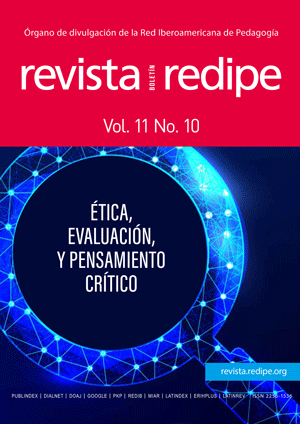Evaluation, learning and context
Main Article Content
Keywords
Education, Evaluation, Post-processual, Social, Contexts, Non-parameter
Abstract
This article proposes a comparative review of evaluation as a historical procedural form and the possibility that a type of post-processual evaluation may emerge within the broad educational field.
It starts from verifying the theoretical-practical conditions that emerged with the evaluation of learning in the 20th century and the postulates of the main criteria promoted from the contributions of Scriven and Bloom. Returning to its subsequent development in the evaluation by competencies, it is pointed out how its purposes are going to specifically evaluate people without taking into account their social relationship. This framework criterion inherent in evaluations as we know them today is one of the main criteria to be considered in a post-process evaluation.
In this way, collating the types of evaluation that have emerged in modern education, the need is postulated, as education enters post times (postmodernity-postcoloniality), to face the gap in the type of evaluations included in the hegemonic time, assuming a post category, relativizing their experience and at the same time the universe that uses them (educational institution) with a type of post-procedural evaluation aimed at contexts, privileging the community and social dimension.
References
Bautista García-Vera, A. (1994). Trastos en el colegio. Madrid: Fundamentos.
Bloom, B. (1968). Toward a theory of testing which includes measurementevaluation-assessment . Los Ángeles: University of California.
Bloom, B. (1971). Taxonomía de los objetivos de la educación: la clasificación de las metas educacionales. El Ateneo.
Bloom, B., Hastings, J., & Madaus, G. (1971). Handbook of formative and summative evaluation of student learning. New York: McGraw-Hill.
Brown, J., Collins, A., & Duguid, P. (1988). Situated Cognition and the Culture of Learning. s.l.: Institute for Research on Learning.
Cano García, M. (2008). La evaluación por competencias en la educación superior. Revista de Currículum y Formación de Profesorado,, 12(3), 1-16.
Delandshere, G. (2001). Implicit Theories, Unexamined Assumptions and the Status Quo of Educational Assessment. Assessment in Education, 8(2), 113- 133.
Díaz-Barriga , F. (2003). Cognición situada y estrategias para el aprendizaje significativo. Revista Electrónica de Investigación Educativa, 5(2), 105-117.
Díaz-Barriga Arceo, F. (2006). Enseñanza situada: vínculo entre la escuela y la vida. México: McGraw-Hill Interamericana.
Estebaranz García, A. (1994). Didáctica e innovación curricular. Sevilla: Univ. de Sevilla.
González Brambila, S. (1996). Dimensiones del aprendizaje colaborativo. En SOMECE 96: XII Simposio internacional de computacion en la educación (págs. 225-233). México: SOMECE.
House, E. (1997). Evaluación, ética y poder. Madrid: Morata.
Lave, J., & Wenger, E. (1991). Situated Learning Legitimate Peripheral Participation. New York: Cambridge University.
Perrenoud, P. (1999). Avaliação: da excelência á regulação das aprendizagens. Porto Alegre: Artmed Editora.
Perrenoud, P. (2004). Diez nuevas competencias para enseñar: invitación al viaje. Barcelona: Grao
Quintar, E. (2006). La enseñanza como puente a la vida. México: IPN.
Quintar, E. (2008). Didáctica no parametral: Sendero hacia la descolonización. México: Ipecal.
Roegiers , X. (2016). Marco conceptual para la evaluación de competencias. UnescoOficina Internacional de Educación.
Santos Moreno, A. (1998). Desarrollo del ambiente de aprendizaje sicome: Una experiencia documentada. En SOMECE 98 XIV Simposio Internacional de Computación en Educación (págs. 464- 473). Mexico: SOMECE.
Scriven, M. (1967). The metholology of evaluation. En R. W. Tyler, & R. M. Scriven, Perspectives of Curriculum Evaluation, Monograph series on Curriculum Evaluation 1 (págs. 39-83). Chicago: Rand McNally.
Scriven, M. (1973). The methodology of evaluation. En B. Worthen, & J. R. Sanders, Educational evaluation: theory and practice (págs. 60-102). Belmont: Wadsworth Pub.
Shepherd, N. (2016). La mano del arqueólogo: Ensayos 2002-2015. (A. H. Cristóbal Gnecco, Trad.) Popayán: Universidad del Cauca.



